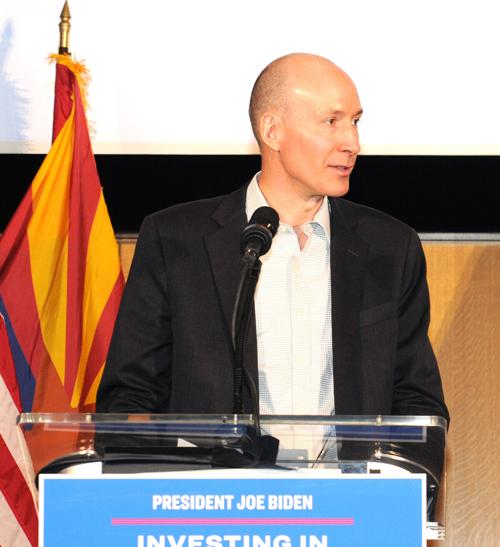Some financial help is on the way for Arizonans whose air conditioners have died or are about to give up the ghost.
A new program entitles those whose earnings are less than 80% of the “area median income’’ to qualify for up to $8,000 to buy and install a new heat pump.
That median income varies by county. The most recent data pegs it at anywhere from about $30,000 in Apache County to $55,000 in Maricopa County.
There also is help available for those whose income is 81% to 150% of the area median income. But the limit on the available cash is $4,000.
The money is coming from the federal Inflation Reduction Act approved in 2022, a point emphasized by David Turk, the deputy secretary of energy, at a briefing Thursday in Phoenix.
Turk insisted the timing of the announcement — less than three months before the general election — had nothing to do with the presidential race, despite the fact there were multiple signs at the event mentioning the Biden-Harris administration.
“When we get these extraordinary tools — $9 billion of federal taxpayer investment in these rebate programs — the direction was ‘Get that money out there as quickly as you possibly can,’ ‘’ he said.
“This is a new program,’’ Turk said. “We want to make sure there’s not fraud, there’s not waste.’’
Each state gets to design the program for its residents.
In Arizona, Gov. Katie Hobbs chose to use the first pot of money — about $76 million — for heat pumps.
These essentially are reversible air conditioners, moving heat from a cool space to a warm space.
In the winter, they draw heat from the outside — there always is some, regardless of how cold it is — and moves it inside. The process is reversed in the summer, taking heat out of the air inside the house.
Hobbs said two years of back-to-back summers of record-setting heat drove her decision on what to prioritize.
“As summers get hotter and cooling systems become more strained in order to provide cooling homes, hundreds of families are going to experience AC malfunction or outage,’’ the governor said. “And, for many families, replacing or getting these systems fixed is out of reach financially.’’
The heat pump rebates are just the first part of how the state intends to use its federal money. The next step will include rebates on everything from electric stoves, dishwashers and electrical panels to higher-efficiency heat pump water heaters and clothes dryers.
Turk said this program — and others, such as tax credits to install solar electric — are built on the premise that while everyone wants to save money, it’s not universally available.
“We have had many Americans, unfortunately, wealthy Americans, who have been able to afford some of these cutting clean-energy technologies for quite a few years,’’ he said. “A lot of those technologies have some up-front costs associated with them that makes it very difficult for all Americans to afford those technologies.’’
Offering a rebate, such as for heat pumps, “flips the script,” he said.
Turk said he believes about 10% of Arizonans have a “significant energy burden.’’
“They’re paying way too much as a percentage of their income for energy,’’ he said.
He figures a family could save about $300 a year with an efficient heat pump.
Other programs available on the federal or state level provide dollars for things like “weatherization,’’ or adding insulation, plugging leaks around doors and windows, and shading sun-exposed windows. Turk said that saves an average of $372 a year.
For rooftop solar, he pegs the annual savings at about $1,600.
Still, he acknowledged, there are limits on who can use the solar credit.
There is no upper income limit for eligibility. The program provides a federal tax credit equal to 30% of the cost of a qualified system. The cost of buying such a system — versus lease programs, in which the contractor keeps the credit — can run in excess of $20,000.
What that means is that a 30% credit — $6,000 using this example — is most useful to those with a sufficiently high federal tax bill.
Turk had no answer to the question of whether the administration is considering revamping the program to make it more financially attractive to those in the lower-income brackets. But he said that, even if solar is out of reach, there are other programs, including the rebates for heat pumps.
Another factor is that Arizona utilities have added new monthly service charges for customers who use solar, saying these help pay for the fixed costs of being attached to the grid. They also in some cases reduced what they pay homeowners who generate more power than needed and sell it to the utility.
That extends out further the number of years necessary for these investments to pay for themselves.
Hobbs acknowledged the utilities have made rooftop solar less attractive. But the governor declined to suggest ways state government can affect that, especially since most private, for-profit utilities regulated by the Arizona Corporation Commission which authorized the changes.
“That’s a whole other can of worms that I don’t want to get into today,’’ she said.
Still, Hobbs said she is convinced of the financial benefit of solar and noted the state got $156 million from the Environmental Protection Agency for its “Solar for All Arizonans’’ program to improve access to rooftop and neighborhood-scale solar generation. That program, she said, benefits low-income families, renters, and rural and tribal communities.
Get your morning recap of today's local news and read the full stories here: tucne.ws/morning





